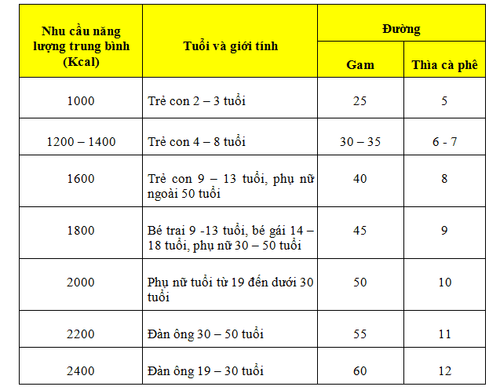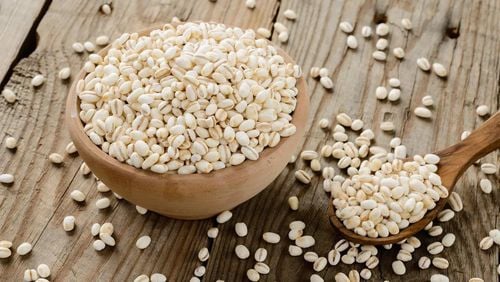This is an automatically translated article.
The article is professionally consulted by Master, Doctor Phan Thi Cam Van - Neonatologist - Department of Pediatrics - Neonatology - Vinmec Danang International General Hospital. He has 07 years of experience as a Resident Doctor and a Pediatrician - Neonatal Doctor at Hue Central Hospital and Hue University Hospital of Medicine and Pharmacy. In particular, he has strengths in newborn care and treatment, neonatal resuscitation, respiratory diseases, digestion, feeding, common problems in newborns.According to the World Health Organization, daily sugar intake should be no more than 10% of daily energy (calories) intake, or better - no more than 5%. Children should not consume more than 6 teaspoons of sugar per day. For children under 2 years old, their nutritional diet should not be added with added sugar, because this can be harmful to the health of the child.
1. Sugar is in which foods?
We all know, sugar is a very familiar condiment. Every day, the sugar provided to the body does not only come from refined sugar. Sweet confectionery, daily fast food is the "culprit" containing a lot of sugar. Sugar is also found in fruits, berries and honey, as well as the main food sources of starches such as cereals, bread, potatoes, etc.
Glucose is one of the main ingredients. that starch metabolizes during digestion. This amount of glucose is enough for the brain and the whole body.
Distinguishing between added sugars and natural sugars found in foods, especially in vegetables and fruits, is extremely important. Natural sugars are good for health. Moreover, foods containing natural sugars such as fruits and vegetables also contain a lot of water, high fiber, vitamins and minerals, low sugar content, etc. are very beneficial to health. On the contrary, many sweet confectionery, chocolate or soft drinks, ... contain a lot of sugar, which is often the favorite food of young children.
2. Effects of eating too much sugar in a day

Ăn nhiều đường làm tăng nguy cơ béo phì ở trẻ.
Adding more than the allowed amount of sugar each day is a cause of the increasing prevalence of obesity, overweight and tooth decay in children. Not only that, this can also leave many bad effects on health later on.
Scientists have proven, a large amount of sugar will stimulate the growth of cancer cells. Eating a diet high in sugar is the cause of increasing the risk of obesity, diabetes and heart disease, which is harmful to health.
The World Health Organization (WHO) believes that high sugar consumption is associated with obesity syndrome and the risk of many other non-communicable diseases. According to statistics, this syndrome causes at least 2.8 million adult deaths each year, not to mention a large proportion of diseases such as diabetes, heart disease, and cancer. In addition, more than 40 million children under the age of five are currently overweight. Eating a lot of sugar causes tooth decay and the cost of tooth decay treatment is also quite expensive, accounting for 10% of the budget spent on the health sector in industrialized countries.
3. How much sugar is allowed per day?
According to WHO, daily sugar intake should not be more than 10% of daily energy (calories), or better - no more than 5%.
In fact, it is difficult to accurately assess the amount of sugar we put into our body each day, especially in natural foods. However, we can still make an approximation. In many products, if sugar is indicated near the top of the product label, there is a good chance the product is high in added sugar. Even if the sugar is listed below, the amount of sugar is not necessarily low. It should also be noted that sugar includes common sugar, dextrose, glucose, fructose and many others.
Depending on the age of the baby, parents can choose the amount of sugar needed in their child's diet.

Bảng lượng đường cho phép mỗi ngày theo độ tuổi.
Research shows that children should consume no more than 6 teaspoons of sugar per day. This amount of sugar is equivalent to a small chocolate bar and less than a can of soft drink. In addition, for children under 2 years of age, the child's nutritional diet should not be added with added sugar, because this can be harmful to the health of the child.
Parents can completely control the amount of added sugar for their baby. Children who consume foods high in sugar tend to eat less healthy foods like fruits, vegetables, whole grains and low-fat dairy products that are heart-healthy.
4. How to reduce daily sugar intake?

Hạn chế cho trẻ ăn đường tinh chế và nước giải khát.
To limit the amount of sugar in the diet of both the baby and the family, in cooking, instead of adding sugar to increase the delicious and attractive taste, housewives can give cinnamon, nutmeg, almonds Almonds, vanilla, ginger or lemon,...
Beverages such as tea and water should not add a lot of sugar, this is also a way to create a healthy taste and low-sugar eating habits. young.
In addition, note to limit some of the following high-sugar foods:
Beverages: Most of each can, each bottle of beverage has sugar that exceeds the amount of sugar that should be eaten each day. Drinking a lot of soft drinks, especially carbonated water, will form a bad habit for children, if taken with them while eating, it can also make children lose their stomach and lose their appetite for other dishes. Candy and sweets, pies, cakes: These child's favorites contain a lot of sugar and carbohydrates that are not good for the body. Fruit juice: Juice is a healthy food but often contains a large amount of sugar. Moreover, due to the habit of adding sugar when mixing to increase the delicious taste, this will exceed the allowed sugar level for daily eating. For children to be healthy and develop well, it is necessary to have a nutritious diet in terms of quantity and quality balance. If children are not provided with adequate and balanced nutrients, it will lead to diseases of excess or lack of nutrients, which adversely affect the comprehensive development of children in terms of physical, mental and motor skills.
Children who do not eat properly are at risk of micro-mineral deficiency causing anorexia, growth retardation, malabsorption,... If they notice the above signs, parents should supplement their children with products. The supplement contains lysine, essential micro-minerals and vitamins such as zinc, chromium, selenium, and B vitamins to help fully meet the nutritional needs of children. At the same time, these essential vitamins also support digestion, enhance nutrient absorption, help improve anorexia, and help children eat well.
Parents can learn more:
Signs of zinc deficiency in children
Micronutrient deficiency and failure to gain weight in children
Please regularly visit Vinmec.com website and update useful information to take care of your child. Take care of the baby and the whole family.













